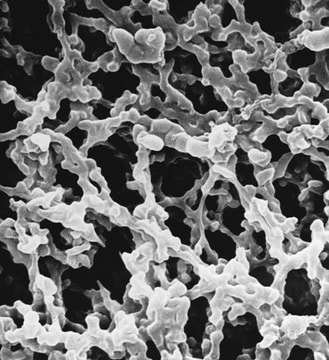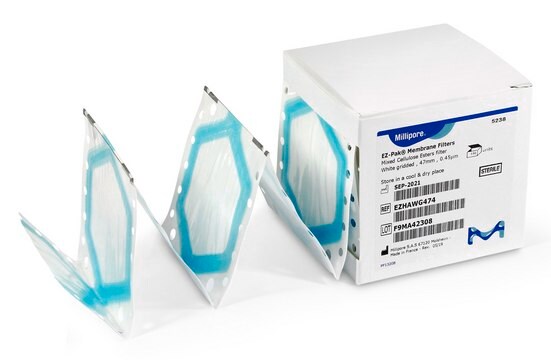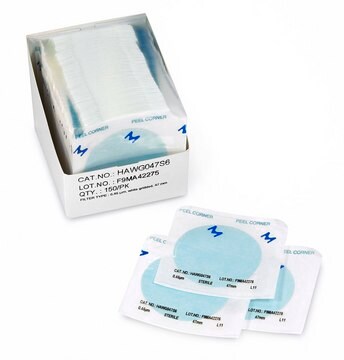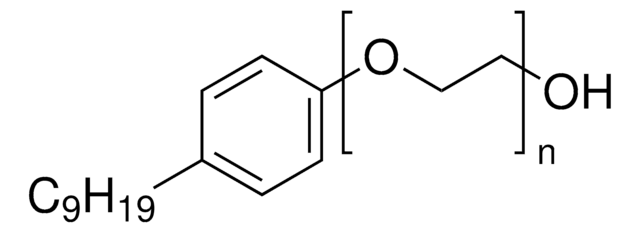HAWG03700
MCE Membrane Filter, 0.45 μm Pore Size
MF-Millipore™, filter diam. 37 mm, hydrophilic, white, gridded
Synonim(y):
MF-Millipore™ Membrane Filter, 0.45 µm pore size, gridded
About This Item
Polecane produkty
Materiały
cellulose membrane
gridded
mixed cellulose esters (MCE) membrane
white filter
Poziom jakości
agency
in accordance with OSHA ID 160
opis
37 mm diameter, mixed cellulose esters (MCE) membrane, hydrophilic, white, gridded, 100 discs
sterylność
non-sterile
Właściwości
hydrophilic
producent / nazwa handlowa
MF-Millipore™
Millipore
sustainability
Greener Alternative Product
Parametry
4 L/min-cm2 air flow rate
60 mL/min-cm2 water flow rate
75 °C max. temp.
Średnica
37 mm
śr. filtra
37 mm
grubość
150 μm
kolor
white
współczynnik refrakcji
n/D 1.51
Matryca
MF-Millipore™
wielkość porów
0.45 μm pore size
79 % porosity
pojemność
155 μg/cm2 adsorption capacity (insulin)
punkt pęcherzykowania
≥1.8 bar, air with water at 23 °C
kategoria ekologicznej alternatywy
Warunki transportu
ambient
Szukasz podobnych produktów? Odwiedź Przewodnik dotyczący porównywania produktów
Opis ogólny
MF-Millipore filters without Triton surfactant contain minimum amounts of wetting agent and have a lower water extractable content than standard MF-Millipore filters.
Features & Benefits:
- Versatile filter for biological and environmental monitoring applications
- Available in a range of pore sizes, colored black or white, with or without a gridded surface
- Compatible with ethylene oxide, gamma irradiation, and autoclave sterilization methods
Zastosowanie
- Clarification of aqueous solutions
- Particle removal
- Particle analysis
- Microbiology analysis
- Isolation of virus-like particles in wastewater
- Microplastics analysis grade water
- Nucleic acid binding, including eDNA
Inne uwagi
- Organism Retention: Microorganism
- Mode of Action: Filtration (size exclusion)
- Application: General laboratory filtration
- Intended Use: Retention or removal of biological contaminants
- Instructions for Use: Sterilizing filtration of a liquid through a membrane with a 0.2 μm (or smaller) pore size effectively removes biological contaminants, including bacteria, mold and yeast. For the selective retention of larger biological contaminents, liquid filtration through membranes with 0.45 μm (or larger) pore sizes may be used to trap and support microorganism growth for subsequent culture and analysis
- Storage Statement: Store in dry location away from heat source
- Disposal Statement: Dispose of in accordance with applicable federal, state and local regulations.
Informacje prawne
Hasło ostrzegawcze
Danger
Zwroty wskazujące rodzaj zagrożenia
Zwroty wskazujące środki ostrożności
Klasyfikacja zagrożeń
Flam. Sol. 1
Kod klasy składowania
4.1B - Flammable solid hazardous materials
Klasa zagrożenia wodnego (WGK)
WGK 3
Certyfikaty analizy (CoA)
Poszukaj Certyfikaty analizy (CoA), wpisując numer partii/serii produktów. Numery serii i partii można znaleźć na etykiecie produktu po słowach „seria” lub „partia”.
Masz już ten produkt?
Dokumenty związane z niedawno zakupionymi produktami zostały zamieszczone w Bibliotece dokumentów.
Nasz zespół naukowców ma doświadczenie we wszystkich obszarach badań, w tym w naukach przyrodniczych, materiałoznawstwie, syntezie chemicznej, chromatografii, analityce i wielu innych dziedzinach.
Skontaktuj się z zespołem ds. pomocy technicznej





